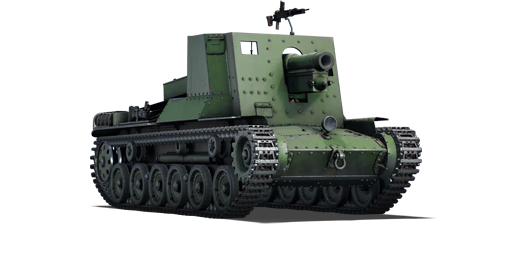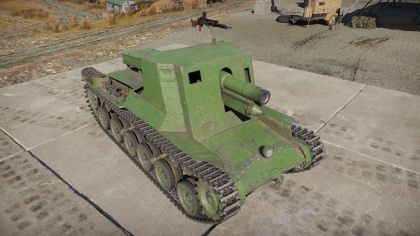Ho-Ro
Contents
Description
The Type 4 Ho-Ro is a rank Japanese tank destroyer
with a battle rating of (AB), (RB), and (SB). It was introduced in Update 1.65 "Way of the Samurai" along with the rest of the Japanese Ground Forces Tree. The vehicle, known by its full designation as the Imperial Japanese Army Type 4 15cm self-propelled gun Ho-Ro (Original Text: 日本語: 四式十五糎自走砲 ホロ), is an open-topped SPG with a short-barreled 150 mm howitzer, based on the Chi-Ha chassis and running gear.
The name "Ho-Ro" translates roughly to Gun Two, or more properly, Self Propelled Gun Number 2.[1]
Since its introduction into War Thunder, the Ho-Ro has gained a reputation for being one of the most powerful howitzer-equipped SPGs in the game despite its reserve battle-rating, right up there with the beloved KV-2. It is capable of destroying or severely disabling any opponent it meets (or more often ambushes), even against vehicles in Rank V. This is mainly due to its extremely effective High-Explosive shell, however this is balanced by the shell's low velocity, in which the player must literally lob the shell in a arc at their opponent even for a short distance, and the vehicle's generally light armour and limited gun traverse compared to other SPGs.
General info
Survivability and armour
Armour type:
- Rolled homogeneous armour
| Armour | Front | Sides | Rear | Roof |
|---|---|---|---|---|
| Hull | 12 mm (80°) Front glacis 15 mm (63°) Joint plate 25 mm (37-64°) Lower glacis |
25 mm (28-36°) Top Left 25 mm (25-26°) Top Right 20 mm Bottom |
17 mm (70°) 20 mm (4-69°) |
8.5-12 mm |
| Turret | 25 mm (15°) | 20 mm (0-11°) | N/A | 12 mm |
Notes:
- Suspension wheels and tracks are both 15 mm thick.
Mobility
| Game Mode | Max Speed (km/h) | Weight (tons) | Engine power (horsepower) | Power-to-weight ratio (hp/ton) | |||
|---|---|---|---|---|---|---|---|
| Forward | Reverse | Stock | Upgraded | Stock | Upgraded | ||
| Arcade | Expression error: Unexpected * operator. | 241 | Expression error: Unexpected round operator. | __.__ | |||
| Realistic | 150 | Expression error: Unexpected round operator. | __.__ | ||||
Armaments
Main armament
| 150 mm Type 38 | Turret rotation speed (°/s) | Reloading rate (seconds) | |||||||||||
|---|---|---|---|---|---|---|---|---|---|---|---|---|---|
| Mode | Capacity | Vertical | Horizontal | Stabilizer | Stock | Upgraded | Full | Expert | Aced | Stock | Full | Expert | Aced |
| Arcade | 28 | -10°/+20° | ±5° | N/A | 5.28 | 7.31 | 8.88 | 9.82 | 10.45 | 26.00 | 23.00 | 21.20 | 20.00 |
| Realistic | 3.57 | 4.20 | 5.10 | 5.64 | 6.00 | ||||||||
Ammunition
| Penetration statistics | |||||||
|---|---|---|---|---|---|---|---|
| Ammunition | Type of warhead |
Penetration @ 0° Angle of Attack (mm) | |||||
| 10 m | 100 m | 500 m | 1,000 m | 1,500 m | 2,000 m | ||
| Type 95 APHE | APHE | 38 | 37 | 35 | 33 | 31 | 31 |
| Type 92 HE | HE | 55 | 55 | 55 | 55 | 55 | 55 |
| Shell details | ||||||||
|---|---|---|---|---|---|---|---|---|
| Ammunition | Velocity (m/s) |
Projectile Mass (kg) |
Fuse delay (m) |
Fuse sensitivity (mm) |
Explosive Mass (TNT equivalent) (g) |
Ricochet | ||
| 0% | 50% | 100% | ||||||
| Type 95 APHE | 290 | 36.10 | 1.2 | 19.0 | 2,600 | 47° | 60° | 65° |
| Type 92 HE | 290 | 36.00 | 0.1 | 0.5 | 7,020 | 79° | 80° | 81° |
Ammo racks
| Full ammo |
Ammo Part |
1st rack empty |
2nd rack empty |
3rd rack empty |
4th rack empty |
Visual discrepancy |
|---|---|---|---|---|---|---|
| 28 | Projectiles Propellants |
22 (+6) 22 (+6) |
14 (+14) 14 (+14) |
10 (+18) 10 (+18) |
1 (+27) 1 (+27) |
No |
Machine guns
| 7.7 mm Type 97 | ||||
|---|---|---|---|---|
| Mount | Capacity (Belt) | Fire rate | Vertical | Horizontal |
| Pintle | 3,000 (20) | 499 | -10°/+60° | ±60° |
Usage in battles
The Ho-Ro is a fairly manoeuvrable SPG, and like many other open-topped vehicles, this is not one that should charge into the front-lines. Just like many of the other low-rank Japanese vehicles, it has no real armour protection from anything more than rifle-calibre MGs, and its ammo storage is literally a box mounted on top of the engine deck. The crew is very exposed, and the gun breech is mounted rather high on the chassis and can be easily knocked out. With this knowledge in mind, the Ho-Ro is best played by staying in the rear (but not distantly) of friendly tanks as short-range or point-blank artillery fire, along with finding hidden positions where it can attempt to be hull-down out of sight of the enemy.
Due to its low-velocity shell, the gun often needs to be aimed higher than the commander estimates when performing direct-fire onto a target, but this also allows the vehicle to lob shells from behind shallow hills, out of the sight from opponents that may be camping or pushing into friendly territory on the other side. Note however that because its HE shell is so powerful, it is extremely risky to fire directly next to or very close to an enemy vehicle, as the light armour may not protect the crew, and the blast from the shell's explosion it will certainly deal damage to the vehicle itself. The gun, while powerful, cannot traverse very far to either side and its depression is actually depressing (-5°), so in order to fire on tanks that are outside of the arc of the gun's horizontal traverse or down a hillside, the entire hull must be traversed as well. The recoil of the gun is also an issue, as it throws the vehicle backwards rather severely (just like the M-56 Scorpion), which means it loses target acquisition every time it fires.
One interesting note is the pintle-mounted MG on the roof, which has good elevation and a much wider range of horizontal fire than the main gun, which can be useful on spotting enemy tanks for team-mates or dealing with SPAAs that have exposed gun-crews. However, it has a slower rate of fire than most other rifle-calibre MGs and its magazine capacity is pitiful. In conclusion, the Ho-Ro is a very defensive vehicle suited to supporting friendly tanks and ambushing the enemy on paths where they may attempt to flank around the map.
Modules
| Tier | Mobility | Protection | Firepower | |
|---|---|---|---|---|
| I | Tracks | Parts | Horizontal Drive | |
| II | Suspension | Brake System | FPE | Adjustment of Fire |
| III | Filters | Crew Replenishment | Elevation Mechanism | |
| IV | Transmission | Engine | ||
Pros and cons
Pros:
- 150 mm howitzer makes it an intimidating foe, largest calibre gun in Rank I
- Howitzer's round trajectory makes it able to fire over hills
- More TNT in its HE shells than the KV-2 (OF-530 HE shell has 6.86kg of TNT, compared to 7.2kg of TNT in the Type 92 HE shell)
- HE load can cause sufficient splash and shrapnel damage even if the shell doesn't directly hit the target
- Can destroy most, if not all, vehicles by shooting HE just under an enemy tank and hitting the thin belly armour
- Can deter inattentive flak trucks or any vehicles with open and exposed crew with its roof-mounted MG
- Quick, manoeuvrable in both AB and RB, though slightly sluggish to put into gear in the latter
- Good 10 degrees of gun depression
Cons:
- Super thin armour, extremely vulnerable to heavy machine guns, SPAAs, and aircraft
- Extreme blast radius can destroy the vehicle if fired too close to oneself
- Ammo Rack is literally a box behind the crew on top of the engine deck, leading to some very explosive ends if hit there
- Massive recoil causes the vehicle to be launched backwards after firing, requiring aiming adjustment after every shot
- Horizontal traverse is disappointing
- Very slow muzzle velocity and limited range
- At long range, the shells have a habit of bouncing harmlessly off armour surfaces without exploding
- AP Shell lacking in penetration for the calibre relies more on HE power
History
The Type 4 Ho-Ro was a Self Propelled Gun developed by the Imperial Japanese Army based off of the German Grille series. It was developed off the Type 97 Chi-Ha chassis and used a 150-millimetre Kruppe gun, considered outdated by 1942. It was used to combat American forces. Only few were made, and out of those few 8 were sunk with a Japanese ship somewhere in the Pacific. Usually deployed in groups of 4, it was used in the Philippines during late 1944 and then used in ones and twos on Okinawa, with a somewhat great affect. It was ineffective due to its 3 degrees of gun swing and 30 degrees of depression because of the gun mounts design. That gave it a small firing distance of 6,000 meters. It also could only fire 5 shells per minute because of the breechloader.
Media
- Skins
- Videos
See also
Links to the articles on the War Thunder Wiki that you think will be useful for the reader, for example:
- reference to the series of the vehicles;
- links to approximate analogues of other nations and research trees.
External links
References
| Japan tank destroyers | |
|---|---|
| Ro-Go Derivatives | Ro-Go Exp. |
| Chi-Ha Derivatives | Ho-Ni I · Ho-Ni III · Ho-Ro · Chi-Ha LG |
| Ho-Ri | Ho-Ri Prototype · Ho-Ri Production |
| Other | Na-To |
| JGSDF | |
| SPRG | Type 60 (C) |
| SPH | Type 75 · Type 99 |
| ATGM | Type 60 ATM |
| Rocket | Type 75 MLRS |
| USA | ▅M36 |





